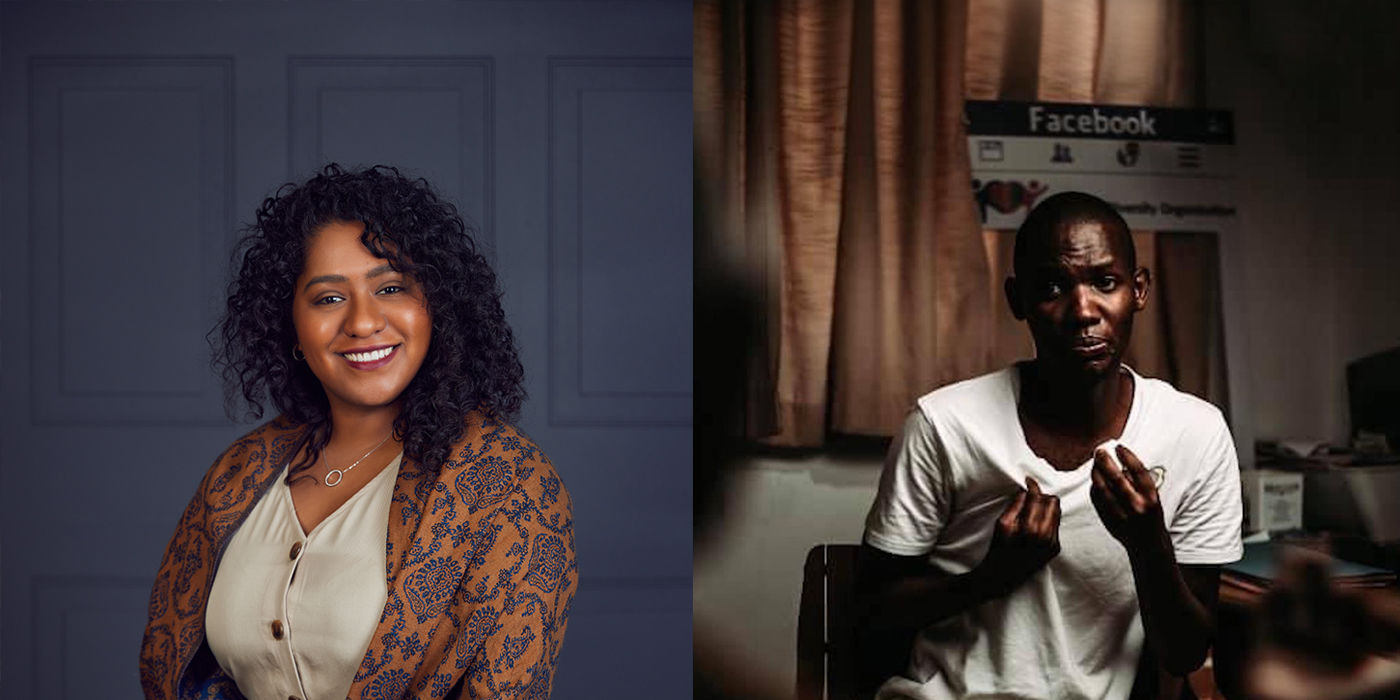In conversation with Atlantic Fellows and LGBTQ+ advocates Joan Jones and Oabona Sepora
The Atlantic Fellows for Social and Economic Equity (AFSEE) programme is an innovative, fully-funded fellowship based in the LSE International Inequalities Institute for mid-career social-change leaders who are working to challenge inequality. We speak with Atlantic Fellows Joan Jones and Oabona Sepora about their experiences, achievements and hopes for the future.
Tell us about you
Joan: I am a Non-Binary Queer Afro-Mexicanx born in the United States as a grandchild of immigrants and a great-grandchild of civil rights activists. I am an advocate, organiser, organisational equity and inclusion practitioner, and Senior Atlantic Fellow for Social and Economic Equity at LSE. Currently, I work as the Executive Director of The Service Employees International Union-Washington State Council, where I spearhead their joint external relations, political and policy work.
I am also a founder of The National LGBTQ Workers Center, the first and longest-running workers' centre focused on Queer and Trans rights in the United States. As President Emeritus, I support and mentor leaders in the centre working on policy and advocacy initiatives around the country.
Oabona: I am a researcher, social worker and Senior Atlantic Fellow for Social and Economic Equity at LSE. I have over eight years of experience in the human rights movement in Botswana and internationally, with a particular focus on the rights of LGBTI people in the Sub-Saharan Africa diaspora. The reason I chose LGBTI activism is because, as an openly queer person, I wanted to contribute to a society that is tolerant of diversity.
In 2017, I founded an organisation called Friends of Diversity (FOD) which is set up to advance the rights of queer people in Botswana. I am also currently working on a comprehensive human rights strategy which entails providing mental health support for LGBTQ+ people in Botswana. The strategy enables the LGBTI community to access sexual reproductive health services without fear of stigma and discrimination. In addressing this, I am advocating for policy changes that are designed to protect the LGBTI community. I have also mobilised stakeholders such as lawyers, civil society organisaters and LGBTI allies to collectively lobby for the protection of the community.
AFSEE Fellows group photo, April 2022
What does being part of the Atlantic Fellow for Social and Economic Equity community mean to you?
Joan: It has meant connecting to a global community of freedom fighters. Before becoming an Atlantic Fellow, I only knew my perspective of being a freedom fighter within the context of the United States as a person of colour. After becoming a Senior Atlantic Fellow, I have learned so much about the roots of global inequity and formed connections with people fighting inequality around the world.
Having access to brilliant thoughts, programmes, and people across the world has been inspirational and integral to my work back at home. It has inspired me to get involved in the fight for progressive revenue at home along with continuing the work I do on the intersection of labour, LGBTQ+ rights and civil rights.
Oabona: The AFSEE community plays a vital role in upholding the values of fairness, commitment, curiosity, kindness and courage. AFSEE provides a space for discussion and dialogue on social and economic inequities, and it has instilled a drive in me to continue challenging the day-to-day inequalities that exist in our society. Through the programme, I have been exposed to new narratives, strategies and methodologies that amplify the work that I am doing in my local community in Botswana. I am truly honoured to be part of this community of changemakers.
What is your biggest achievement in your career so far and what do you hope to achieve in the future?
Joan: Creating the National LGBTQ Workers Center, as it was the first time that I created a space that was needed in my community but did not exist before. It has been beautiful seeing our labour-centred space grow around the country and become a home for Trans workers of colour to train, educate and find leadership opportunities.
In everything I do, I aim to create a more equitable world for the most marginalised people in our society including workers, Black, Indigenous, People of Colour and LGBTQ+ people. My dream is to live in a world where a person’s identity does not automatically resign them to a life of poverty but, instead, provides a system for them to self-actualise and thrive in a fair and just economy that centres around care and interdependence.
Oabona: The biggest achievement I have had in my career so far is when I was part of LGBTI history as a litigant that challenged the government of Botswana to respect LGBTI rights. In 2014, in the Attorney General of Botswana v. Rammoge case, the high court ruled in favour of the litigants to allow the state to register an LGBTI organisation (Lesbians, Gays and Bisexuals of Botswana LeGaBiBo). The government appealed, but we won the case in 2016. The case was overwhelming for me, but it made me stand out as a public figure and inspired other young Africans to take initiative in creating change in their communities. The same case also led to the decriminalisation of same-sex acts in the Botswana Penal Code, and I am glad that I was part of the advocacy team whose work led to that momentous outcome.
My biggest dream is to see the LGBTI community in Botswana thrive. Through my work, I hope to contribute to the building of a society where people live in harmony with each other despite their differences. This is also why I have recently started a mentorship consultancy where I mentor and encourage people who would like to contribute to that effort as well.
